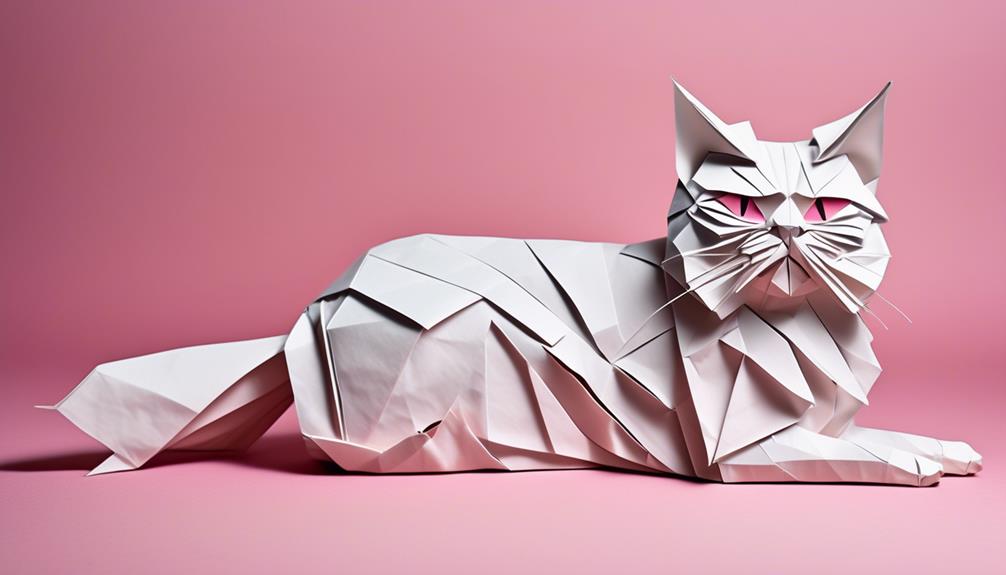Your older cat’s skin may become more sensitive over time due to diet or health issues, leading to decreased interest in grooming and less enjoyment of petting. It’s important to handle them gently, recognizing their changing needs as they age.
Learn to identify the signs of your cat’s comfort and well-being by observing their skin closely. This will help you understand their sensitivity and strengthen your bond with your pet.
Key Takeaways
- Aging cats may experience sensitive skin, which can be identified by signs such as reluctance to be touched, decrease in grooming, and changes in behavior indicating discomfort.
- Common irritants for aging cats with sensitive skin include household cleaners, grooming products, synthetic fragrances, pest control chemicals, and rough textiles.
- Nutritional influences play an important role in maintaining the skin health of aging cats, with omega-3 fatty acids, proteins, amino acids, and antioxidants being beneficial for inflammation management, skin repair, and defense against oxidative stress.
- Proper bathing and hygiene practices for aging cats with sensitive skin involve regular grooming, using cat-specific shampoos and conditioners, a gentle approach, controlling bath frequency to avoid over-drying the skin, and consulting a vet for product advice and signs of skin irritation.
Identifying Sensitive Skin
One may notice that a beloved aging cat might show a reluctance to be touched, a sign that could point to sensitive skin or discomfort. As your senior cat advances in years, you’ll likely become more attuned to their needs and habits. When you start to notice your cat avoiding once-loved caresses or shying away from your hand, it’s important to approach the situation with a gentle heart.
Aging cats may experience a decrease in grooming, their coat losing the luscious sheen it once had. This isn’t simply a matter of vanity; it can be a cry for help, an indication that your cat might be in pain. If they’re suddenly avoiding the litter box or hesitant to leap onto their favorite perch, these behaviors can further suggest that your cat’s skin and body may not feel as supple and pain-free as they used to.
Common Irritants
As cats age, their skin can become intolerant to a variety of irritants, ranging from household chemicals to grooming products, which may worsen their discomfort and pain. It’s essential to recognize these common irritants to provide your older cat with a comfortable and nurturing environment. Senior cats might not cope well with the synthetic fragrances or harsh ingredients in some cleaning agents, which can lead to skin reactions.
Being mindful of the products you use around your home is a simple yet impactful way to care for your aging cat.
Here’s a table highlighting irritants that might affect your cat with sensitive skin:
| Common Irritants | Potential Effects on Cats |
|---|---|
| Household Cleaners | Allergic reactions, skin irritation |
| Grooming Products | Itchiness, discomfort |
| Synthetic Fragrances | Dermatitis, agitation |
| Pest Control Chemicals | Rashes, health risks |
| Rough Textiles | Increased pain sensitivity |
When cats age, their capacity to tolerate these irritants diminishes. Paying attention to changes in behavior, such as aversion to being petted or increased licking over joints, can signal sensitivity issues. If you notice any signs of discomfort in your cat, it’s important to act promptly. A visit to the veterinarian can help you understand the root cause and provide relief for your beloved senior cat’s sensitive skin.
Nutritional Influences
Your aging cat’s skin health is deeply influenced by the nutrients they consume, with the right balance of omega-3 fatty acids, proteins, and antioxidants playing a pivotal role in maintaining their comfort and vitality.
Nutrition requirements shift as your furry companion matures, and understanding these changes is key to preventing skin issues that can cause them discomfort.
Proper nutrition can bolster your elderly cat’s skin, making it less susceptible to irritation. Omega-3 fatty acids, found in fish oil and certain plants, are essential in managing inflammation and keeping their skin supple. Meanwhile, proteins and amino acids are the building blocks for repairing and nurturing their skin and coat. Without adequate protein, your cat may experience hair loss and skin problems.
Antioxidants in food as well play a critical role. They defend against oxidative stress, which can otherwise accelerate aging and contribute to sensitive skin. It’s also important to monitor their diet for signs of weight loss, which can indicate that their nutritional needs aren’t being met.
Caring for your elderly cat means paying close attention to their diet. By meeting their nutritional needs, you’re not just feeding their body; you’re healing their skin and enriching their golden years with comfort and joy.
Bathing and Hygiene
Taking care of your old cat’s diet is important for keeping their skin healthy. It’s also necessary to bathe and groom them regularly to help protect their sensitive skin. Older cats have more delicate skin, so it’s crucial to handle them gently. Grooming helps to clean off any dirt and remove loose hair, and it spreads the cat’s natural oils over their fur, which keeps it shiny and helps prevent skin problems.
When you bathe your cat, always use cat-specific shampoos and conditioners. These products are designed to be gentle on their skin and ensure the coat remains soft and hydrated. Remember, the goal is to soothe, not strip their sensitive skin of essential oils.
Here’s a simple table to guide you through the do’s and don’ts of bathing and grooming your aging cat:
| Do’s | Don’ts |
|---|---|
| Use cat-specific shampoos | Bathe too frequently |
| Groom regularly to remove loose hair | Use harsh grooming tools |
| Consult a vet for product advice | Ignore signs of skin irritation |
| Be gentle and patient during grooming | Forget to reward your cat for their patience |
Always pay attention to the frequency of baths to prevent over-drying their skin, and consult your veterinarian for advice on specific products that are suitable for your older cat’s needs. Gentle, loving care can make all the difference in maintaining the health and happiness of your senior companion.
Choosing the Right Products
As your cat ages, their skin becomes more delicate, and it’s essential to choose products that soothe and protect.
You’ll want to look for hypoallergenic shampoo options that cleanse gently without causing irritation, and moisturizing skin treatments that help to maintain their skin’s health.
Selecting gentle grooming tools can make all the difference in keeping your cat comfortable and happy.
Hypoallergenic Shampoo Options
Selecting the ideal hypoallergenic shampoo for your aging cat’s delicate skin requires careful consideration of the ingredients to prevent any discomfort or allergic reactions. As your senior cat may face challenges like spinal arthritis, pain management becomes a pivotal aspect of care, including during bath time.
Here are some gentle, soothing options:
- Natural ingredients like aloe vera or oatmeal, known for their calming effects
- Fragrance-free formulas to minimize the risk of irritation
- Shampoos specifically designed for senior cats with potential for cognitive decline
Moisturizing Skin Treatments
Beyond finding a gentle shampoo, it’s essential to consider moisturizing skin treatments that cater to your aging cat’s need for hydration and comfort. As cats advance in years of age, their sensitive skin can become a painful condition without proper care.
To serve your cat best, select hypoallergenic, fragrance-free moisturizers, devoid of harsh chemicals like alcohol, dyes, or artificial fragrances that can worsen irritation. Natural ingredients such as oatmeal, aloe vera, or coconut oil are soothing options that can provide relief.
Since every aging cat is unique, it’s wise to consult your veterinarian, who can recommend moisturizing skin treatments tailored to your pet’s specific needs, ensuring their golden years are as comfortable and happy as possible.
Gentle Grooming Tools
When choosing grooming tools for your aging cat, opt for those with soft bristles or delicate rubber tips to ensure your beloved companion‘s comfort and avoid skin irritation. Your cat’s sensitive skin requires a gentle touch, especially as they grow older and may display behavioral changes that signal discomfort during grooming sessions.
Here are some gentle grooming tools to consider:
- Grooming gloves or mitts that offer a soothing massage
- Soft brushes designed for cats with sensitive skin
- Fine-tooth combs to detangle without pulling
Always choose products that nurture your aging cat’s skin, avoiding harsh chemicals that could exacerbate sensitivity.
Environmental Factors
As your cat ages, its skin becomes more sensitive to environmental changes like humidity shifts and allergens. It’s important to know which environmental factors can worsen your older cat’s sensitive skin.
The table below highlights key environmental contributors to sensitive skin in older cats:
| Factor | Effect on Aging Cat’s Skin | Consideration |
|---|---|---|
| Temperature & Humidity | Dryness or Oiliness | Maintain a stable indoor climate |
| Chemicals & Pesticides | Irritation & Allergies | Use pet-friendly products |
| Airborne Irritants | Allergic Reactions | Regularly clean to reduce dust and pollen |
| Sun Exposure & Pollutants | Sunburn & Dryness | Limit outdoor time and provide shade |
Your beloved pet may show signs of discomfort due to these factors, which can also exacerbate common diseases. To serve your aging cat better, pay attention to their environment. Are they scratching more after you clean? Do they seem restless on hot days?
These observations can help you create a more comfortable space for them. Simple acts like swapping to natural cleaners and maintaining a tranquil home can greatly improve their skin health and overall well-being.
Veterinary Care Tips
To safeguard your aging cat’s health, ensure regular veterinary check-ups to monitor and manage any skin sensitivities or other age-related conditions. It’s vital to stay vigilant about changes that could signify underlying health issues. Gentle, compassionate care can make all the difference for your cherished cat.
When you visit the vet, keep these veterinary care tips in mind:
- Daily brushing isn’t just a bonding activity; it helps evaluate your cat’s coat quality and stimulates blood circulation, which is beneficial for skin health.
- Observing behavior such as decreased activity or losing weight can be early indicators of diseases affecting your feline friend. Don’t overlook subtle changes, as these might be signs of issues like urinary tract infections or other concerns.
- Regular bloodwork can provide insights into your cat’s overall health, revealing problems that may not be immediately apparent, such as organ function or hormonal imbalances.
Your aging cat relies on you to interpret their needs. Changes in fur and skin, less interest in play, or alterations in bathroom habits are your cues to seek veterinary guidance. With your attentive care and regular professional support, you can help manage the golden years of your cat’s life with grace and love.
Frequently Asked Questions
What Can I Do for a Cat With Sensitive Skin?
To soothe your cat’s sensitive skin, gently groom with a soft brush and use hypoallergenic shampoos. Ensure a stress-free environment, and consult your vet for specific treatments or dietary changes.
How Do I Know if My Elderly Cat Is Suffering?
If your elderly cat is grooming less, using the litter box differently, or hesitating to jump, these may be signs of pain. It’s important to take care of them with extra love and attention to make their later years comfortable.
How Can I Help My Cat With feline Hyperesthesia?
To help your cat with hyperesthesia, create a calming environment, avoid touching the sensitive areas, and consult your vet about possible medications or treatments to ease their discomfort and manage symptoms.
Why Is My Cat so Sensitive to Touch?
Your cat’s sensitivity to touch may manifest from pain or hyperesthesia. Gently gauge their comfort, considering cozy, cushioned spots for serene sleep, and consult a vet to craft a caring, comprehensive pain management plan.




